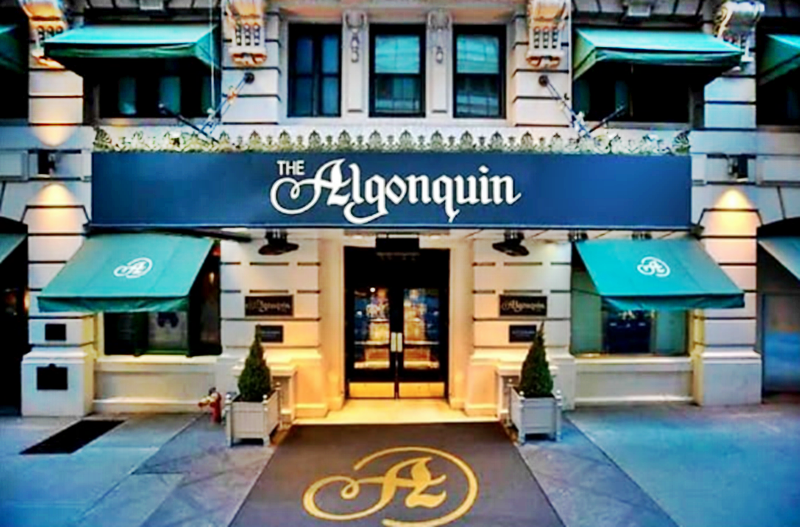THE ALGONQUIN HOTEL, NYC.

By AI-ChatGpt4o-T.Chr.- Human Synthesis-06 Oct. 2024.
The Hotel Algonquin in New York City is famously associated with the Algonquin Round Table, a group of writers, critics, and actors who met regularly in the hotel’s dining room from 1919 to 1929. This gathering, which included well-known figures like Dorothy Parker, Robert Benchley, and George S. Kaufman, earned the hotel its literary reputation.
The Blue Bar, located just inside the hotel, is a small, cozy space that became a favorite spot for writers and creative minds, both during the Round Table era and afterward. It's known for its classic New York atmosphere, where authors and artists would gather for conversation, drinks, and inspiration. The bar has maintained its legacy as a haven for literary minds visiting or residing in the city.
The Algonquin Hotel is steeped in classic charm, and the old-fashioned style of its original architecture and design still shines through. The vintage elevator, an open-style lift with wrought iron detailing, reflects the early 20th-century elegance of the hotel. It transports guests to the upper floors, where they can stay in beautifully preserved rooms.
The suites, especially those with four-poster beds, capture the luxurious yet intimate feel of classic New York. These rooms often feature rich wooden furniture, period decor, and elegant fabrics, creating an atmosphere of timeless refinement. Staying at the Algonquin allows visitors to experience a piece of literary and architectural history in the heart of Manhattan.
As a travel executive for Keith Prowse Ltd. in London, staying at the Algonquin must have provided an ideal setting for your business trips. With its rich literary history and classic New York ambiance, the hotel would have been a fitting choice for international executives seeking comfort and a touch of elegance.
The Algonquin's location, close to Times Square and the theater district, would have made it convenient for a company like Keith Prowse, especially known for theater and event tickets. You must have experienced firsthand the charm of the Blue Bar, the timeless rooms, and the atmosphere that has attracted artists, authors, and executives alike. It's great to hear about your connection to such an iconic place!
The Algonquin Hotel is steeped in classic charm, and the old-fashioned style of its original architecture and design still shines through. The vintage elevator, an open-style lift with wrought iron detailing, reflects the early 20th-century elegance of the hotel. It transports guests to the upper floors, where they can stay in beautifully preserved rooms.
The suites, especially those with four-poster beds, capture the luxurious yet intimate feel of classic New York. These rooms often feature rich wooden furniture, period decor, and elegant fabrics, creating an atmosphere of timeless refinement. Staying at the Algonquin allows visitors to experience a piece of literary and architectural history in the heart of Manhattan.
It sounds like you have some wonderful memories tied to the Algonquin and your travels with Keith Prowse Ltd. There's something special about revisiting iconic places that have played a role in your professional and personal history. If you ever find yourself reminiscing about those times or planning future travels, the charm of such historic locations never fades!
The Algonquin Hotel has changed ownership several times over the years. Initially, it was opened in 1902 by its original owner, Frank Case, who played a significant role in shaping its literary and artistic reputation. He welcomed writers, actors, and musicians, helping to establish the famous Algonquin Round Table gatherings.
In more recent history, the hotel has been owned by various companies. In 1987, it was sold to the Camberley Hotel Company, and then in 2002, Miller Global Properties acquired it.
Eventually, Marriott International's Autograph Collection added the Algonquin to its portfolio in 2010, continuing its legacy as one of New York’s most storied hotels. Despite the ownership changes, the Algonquin has preserved much of its historical charm and literary tradition.
